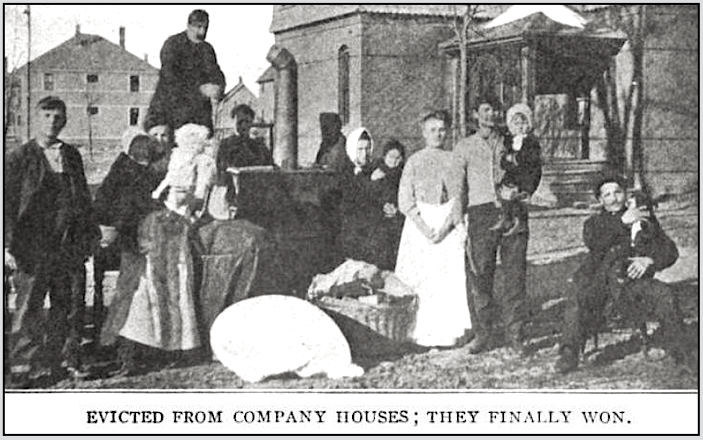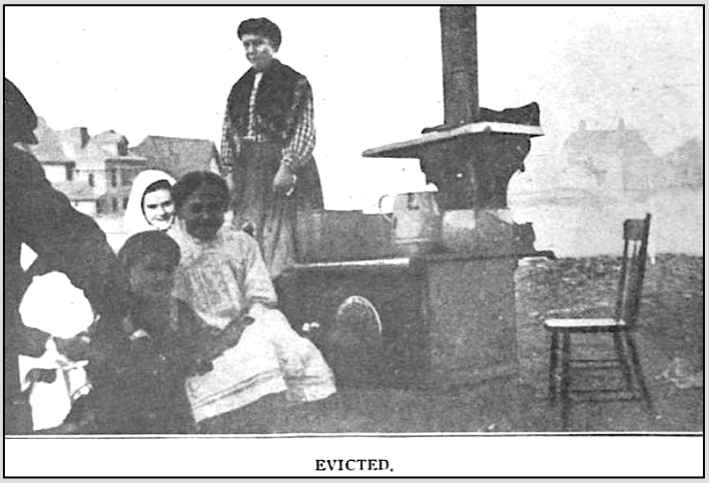 ———-
———-
Hellraisers Journal – Saturday March 5, 1910
Ludlow, Massachusetts – Textile Strikers Achieve Partial Victory
From the International Socialist Review of March 1910:
PARTIAL VICTORY AT LUDLOW.
Announcement was made Feb. 6th in a meeting of the Central Labor union that a complete understanding on the wage scale question had been reached between the Ludlow Manufacturing Associates and their 1,700 employes who struck in September because of a cut in wages.
The wage scale on which the State Board of Arbitration has been at work since the strikers returned to work has been settled by the acceptance by the strikers of a proposition from the associates.
The strike of the Polish employes, now at an end, is regarded as one of the greatest battles between labor and capital which has occurred in some time, not only because of the element of paternalism in it, but also because of the principles involved in the strike.
The conflict began early in September, when creel boys left the mills because of a cut in wages. On the 12th, because of a notice lowering the price given the weavers, the creel boys were joined by the weavers in No. 8 mill. At that time the company cut the price for a 100 yards of bagging from 24 to 20 cents a roll, the cut going into effect on the 13th.
From that point the strike gradually involved more and more employes until at one time between 2,500 and 2,800 were out of the mills.
On two occasions the company evicted strikers from their houses, ostensibly to provide accommodations for new employes and by both eviction processes fully 400 strikers were thrown out into the street at a time when the weather was bitterly cold.
Gov. Eben S. Draper and the State Board of Arbitration were then called in to effect a settlement. After some delay the state board announced that all difficulties were at an end and the striking employes, then numbering about 1,700, returned to work, only to walk out again after an hour’s labor because of alleged misuse by overseers in the mills.
Through the most intense periods of the strike both the company and town employed large forces of Pinkerton detectives and special deputies, and the cost to both has been very great. Finally, after further effort by the state board the strikers in a massmeeting Sunday, December 19, voted to return to work at the cut wage pending arbitration of that question by the state board, and in lots of 300 daily for a week they re-entered the mills.
The union into which the strikers were formed [*] is already strong and has on hand a fund of over $2,000 in case any further trouble arises.
[Emphasis added.]
*Note: In the struggle between the United Textile Workers of America and the National Federation of Weavers, it appears that the United Textile Workers has emerged as the union representing the majority of the textile workers of Ludlow.
From the Charleston Labor Argus of December 9, 1910:
FORCED FROM THEIR HOMES
—–
Women and Children Sleep in Streets
Without Shoes and Stockings
-Pathetic Spectacle.
—–The Ludlow Manufacturing Association, who own the jute and hemp product mills at Ludlow, Mass., last week evicted their striking Polish tenants from their houses and forced nearly 400 into the street, where they have been huddled in improvised shelters on the streets, suffering intensely from the cold and rain.
Of those made homeless at least seventy-five slept in the open. Whole families huddled about feeble fires built of wood from the cellars of the evicted families.
Some of those evicted are without shoes and few of the men and only a part of the women have stockings. Women with infants in their arms and women about to become mothers have walked the streets dividing their time between the streets and the shelter of homes of unevicted families.
The household furniture piled promiscuously in the streets presented a pathetic spectacle. Keepsakes were trampled ruthlessly in the mud. A man of eighty years, supporting himself with a cane, spent the greater part of the day ruefully surveying the remains of a wood-pile which the had cut and split. The children of the evicted families overhauled piles of furniture in search of their toys, and the finding of a doll or a ball was the signal for exclamations of delight.
Many of the evicted families were sheltered with fronds in the Polish colony in Indian Orchard. Polish families in Ludlow, which still have roofs over their heads, have been liberal donors of provisions. The town of Ludlow, however, must face in the immediate future the problem of providing not only for those now homeless, but for hundreds of others who are to be turned into tho streets within the next few days.
[Emphasis added.]
~~~~~~~~~~~~~~~~~~~~~~
SOURCES & IMAGES
Quote Mother Jones, re Ruling Class, AtR p2, Jan 23, 1909
https://www.newspapers.com/image/66981597/
The International Socialist Review, Volume 10
(Chicago, Illinois)
-July 1909-June 1910
C. H. Kerr & Company, 1910
https://books.google.com/books?id=MVhIAAAAYAAJ
ISR – Mar 1910
https://play.google.com/books/reader?id=MVhIAAAAYAAJ&printsec=frontcover&pg=GBS.PA769
“Partial Victory at Ludlow”
https://play.google.com/books/reader?id=MVhIAAAAYAAJ&printsec=frontcover&pg=GBS.PA853
https://play.google.com/books/reader?id=MVhIAAAAYAAJ&printsec=frontcover&pg=GBS.PA854
The Labor Argus
(Charleston, West Virginia)
-Dec 9, 1909
https://chroniclingamerica.loc.gov/lccn/sn85059855/1909-12-09/ed-1/seq-1/
See also:
For more on Ludlow MA Textile Strike of 1909-1910, see:
https://chroniclingamerica.loc.gov/search/pages/results/?date1=1909&sort=date&rows=50&searchType=basic&state=&date2=1910&proxtext=ludlow+strike&y=13&x=9&dateFilterType=yearRange&page=1
https://www.newspapers.com/search/#query=ludlow+textile+strike&ymd-start=1909-09-01&ymd-end=1910-03-31&p_place=MA
For more on UTW v NFW during Ludlow MA Textile Strike, see:
https://www.newspapers.com/search/#query=ludlow+%22united+textile+workers%22+%22national+federation+of+weavers%22&ymd-start=1909-09-01&ymd-end=1910-03-31&p_place=MA
~~~~~~~~~~~~~~~~~~~~~~~~~~~~~~~~~~~~~~~~~~~~~
John Golden and the Lawrence Strike – Willard Losinger
Lyrics by Joe Hill
(Hint of what is to come re United Textile Workers.)
“Weaving cloth with bayonets is hard to do.”


